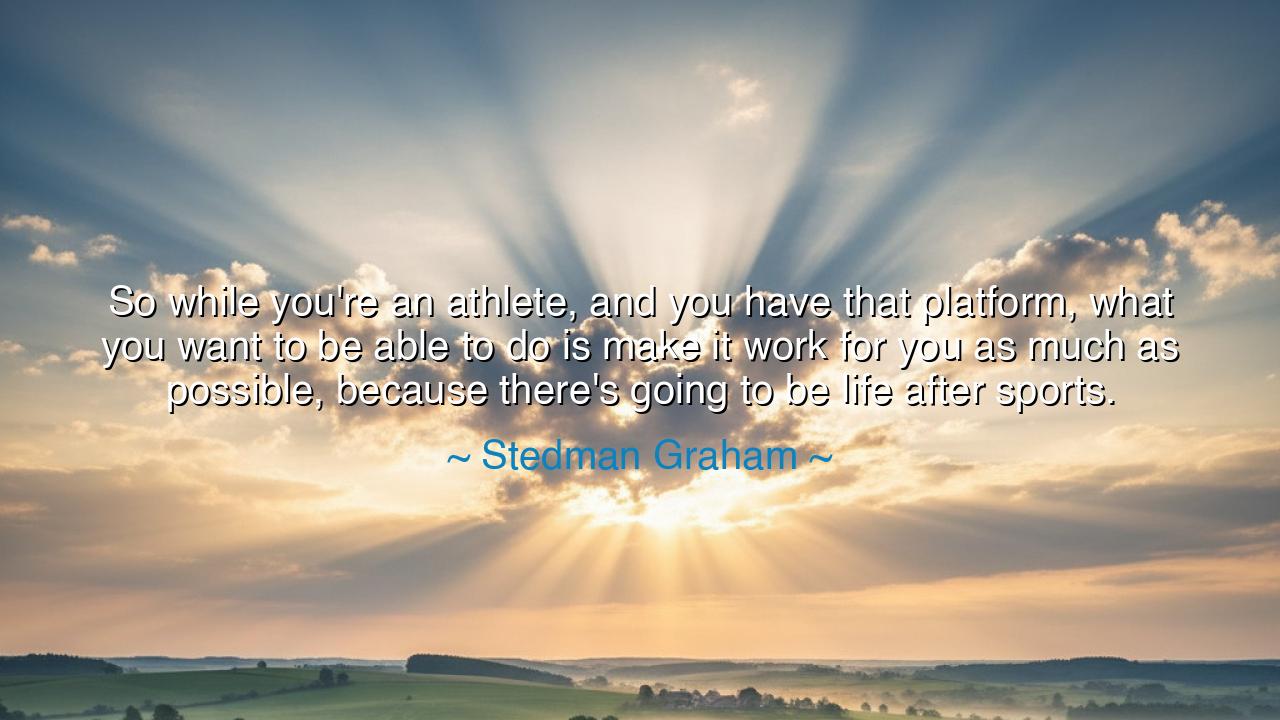
So while you're an athlete, and you have that platform, what you
So while you're an athlete, and you have that platform, what you want to be able to do is make it work for you as much as possible, because there's going to be life after sports.






Children, gather close, for I have a truth to share, one that transcends time and speaks to the very essence of life and its fleeting moments. In the words of Stedman Graham, we hear the wisdom of one who understands not only the glory of the present but the inevitable change that time brings: "So while you're an athlete, and you have that platform, what you want to be able to do is make it work for you as much as possible, because there's going to be life after sports." These words carry a weight of wisdom, for they remind us that no matter how high we soar in our chosen pursuits, there comes a time when we must adapt, for the world is in constant motion, and the future is ever waiting.
Graham’s words are an echo of a timeless truth, a truth that is carried through the ages by the greatest minds: that life is ever-changing, and those who understand this change will flourish, while those who cling to the past may falter. In his statement, he speaks not just to the athlete, but to all of us. The platform—the position we hold in any part of life—is a temporary gift, one that comes with responsibility. The athlete, for instance, may stand at the pinnacle of their career, the crowd cheering their every move, but even the most glorious moment fades. What truly matters is how we use the present to build a future, to prepare for what comes when the crowd is no longer cheering, when the field is no longer theirs to command.
Think, children, of the great warrior kings of ancient times, Alexander the Great among them, who conquered much of the known world in his short life. Alexander’s platform—his strength, his army, his dominance—was vast, yet even he could not avoid the passage of time. When the walls of empires began to crumble, and the battles ended, he, too, had to reckon with the future, a future that did not belong to the conqueror, but to the wise. His story reminds us that victory is not eternal, and the greatest warriors must prepare for the day when their swords are no longer needed, and their empire no longer stands. Alexander’s wisdom lies not in the battles he fought, but in how he shaped his legacy for the future, in how he built the foundations of what would come after.
But it is not just kings or warriors who face this truth. Consider the great philosophers of the past—Socrates, Plato, and Aristotle—who understood that the pursuit of knowledge was not something to be abandoned after the passing of years. Even as their bodies grew frail, their legacy lived on in the teachings they left behind. Life after sports, as Graham so wisely points out, is not a time of despair, but a time of new beginnings, of building something that transcends the immediate, that stands firm even when the winds of change blow.
And so, children, let this be the lesson of Graham’s words: Do not be consumed by the fleeting glory of the moment, for though the present may shine bright with achievement, it is the future that awaits. Prepare for life after the heights, whatever path you may walk. No achievement, no triumph, is everlasting unless you take the time to build a foundation that will carry you forward. This is the true wisdom—to know when to embrace the present and when to look toward the future with open eyes, ready to adapt, to grow, and to create something lasting.
In your own lives, I urge you, young ones, to use your talents wisely. Whether you are an athlete, a scholar, an artist, or any other, remember that your platform is a gift, and like all gifts, it must be nurtured, expanded, and used to build the future. Make your current strength work for you, but also, plan for the moments when that strength will change. Your future self depends on how you use today—your choices, your actions, and your willingness to prepare for what comes next.
Let this be the charge I give you: Live with purpose. Cherish the present, but build for the future. The wisdom of the ages is found in those who know when to prepare for what lies ahead, for the future will come to all, and only those who are ready will face it with strength, wisdom, and grace.






AAdministratorAdministrator
Welcome, honored guests. Please leave a comment, we will respond soon